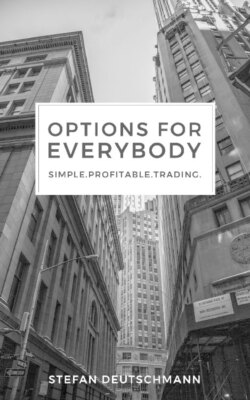Читать книгу Options for everybody - Stefan Deutschmann - Страница 14
На сайте Литреса книга снята с продажи.
Оглавление2.5 Repitition: Understanding Call Options
At this point we would like to repeat the essential components. Before you groan bored, it's fast and important. The basics really have to sit - just like in school. Every strategy in the options area consists of calls, puts or a combination of both. It is therefore of the utmost importance to master them. So let's go over what we've learned.
In the last sections, you learned that a stock option is actually just a contract to buy or sell shares at a fixed price for a limited period of time. The fixed time is called the expiration, and the fixed price is called the strike. One of the most important things to remember about options is that 1 contract represents 100 shares. So if you sell an option contract for 1.00 USD premium, that's actually 1.00 USD per share, so a total of 100 USD premium. An option contract of 0.50 USD costs 50 USD as buyer or brings you 50 USD as seller. Each option has its own price, which is derived from the Black-Scholes option price model. Black and Scholes received the Nobel Prize for it, but I'm not going to torture you with this formula now. More important is that you understand the ingredients and their effects. Memorizing formulas is only for know-it-alls (and students - we all had to go through that). The most important factors affecting option prices are the stock price and the time remaining before the option expires and volatility. For this reason, the options market is a derivative market for the actual share. However, other factors such as gamma play a role, but we will discuss these components later.
A call option is a contract that you can purchase. With this purchase, you can buy 100 shares at the predetermined strike price at the end of the contract. Just like a stock, you can also sell a call, obliging you to provide 100 shares at the end of the contract and at the chosen strike price if the stock price is above the chosen strike price.
If you own a call and the stock price is above the strike price, the value of the call also increases - it now has a higher value than before because you could buy the stock at a discount (the strike price). If the stock falls below your strike price, the value of the call option also drops. Why should anyone buy shares at a higher price than what the market is currently offering? Answer: Nobody would! If you have a call, you don't have to buy the stock before the contract expires. You could close the position and take the profit/loss without taking ownership of the stock. You could also choose to exercise the option and acquire ownership of the stock at the strike price at which the call was bought if the stock price is above your strike price. In principle, however, as a buyer you are not obliged to any activity, you can also wait and do nothing.
If you make a short call, you are obliged to provide 100 shares at the request of the buyer if the share price is above your strike. However, there are measures you can take to prevent this. Before the expiry, you have the right to close the position prematurely and realise the profit/loss you have achieved, just like with a long call. Detailed explanations will of course follow throughout the book.
Of the four basic option transactions (long call, short call, long put and short put), the call option is the one that comes closest to buying 100 shares. This is due to the fact that you benefit from an increase in the share price, just like pure shares, and you have unlimited profit potential at the same time. The call buyer is "long" because he expects to sell the option later at a higher price. When you buy a long call, you pay a premium to open the position. To benefit from this, you must be right in your assumption of rising prices before the contract expires and the option must be worth more than the premium you paid for it. The maximum loss is the premium paid, the potential profit is unlimited.
Remember that the buyer of a long call wants the price of the option and the stock to rise. When we sell a call, the call is "short", so we take the other side of the transaction and want the value of the call to go down. The biggest advantage of the short side is that we don't necessarily need the stock price to be profitable until the expiration date. The stock price can fall, stay the same or even rise a little as long as it is not above our strike when it expires.
That sounds complicated, but it's not. This approach is very similar to that of an insurance agency. When you sell a call, you are betting that the stock price will not reach your strike until it expires. Insurance agencies and casinos live from the fact that they do NOT pay out more than they earn and their insurance premiums and gambling opportunities are prepared to ensure that this happens in the long run.
